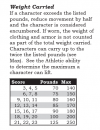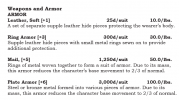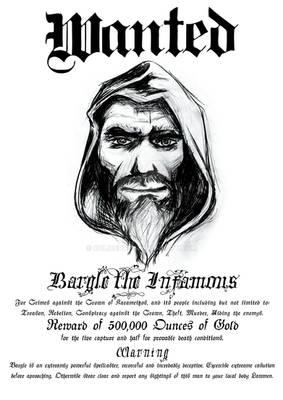robertsconley
Legendary Pubber
- Joined
- May 3, 2018
- Messages
- 5,652
- Reaction score
- 14,705
In my Basic Rules for my Majestic Fantasy RPG I have the following

I included because there are times when knowing the exact amount a character can carry or lift is useful.
For armor you just reduce your max move. Why? Because while amor isn't hindering it is extra weight and you need to pace yourself. Technically if I had a fatigue system, it would make sense to allow a character the normal full move but at a fatigue. But the OD&Dish compromise is to cut down on the max move.

What I didn't do and I will correct this in the Manual of Pussiant Skill which has the full rules for characters and what they can do. Is state the following.

I included because there are times when knowing the exact amount a character can carry or lift is useful.
For armor you just reduce your max move. Why? Because while amor isn't hindering it is extra weight and you need to pace yourself. Technically if I had a fatigue system, it would make sense to allow a character the normal full move but at a fatigue. But the OD&Dish compromise is to cut down on the max move.

What I didn't do and I will correct this in the Manual of Pussiant Skill which has the full rules for characters and what they can do. Is state the following.
Rob's Note: I do not recommend requiring players to track every pound of weight. Instead only do a weight tally when it become obvious that the character is faced with a situation involving carrying a lot of items. The two most common examples from my campaigns are outfitting the party with supplies for long duration travel or winning a large treasure hoard. Outside of these circumstance continually tallying weight is an annoyance to referees and players alike. A good compromise is to come up with equipment packs with precalculated weights. I included several in these rules as an aide.




 No Thonk, that's precious 800 count Pima cotton with goose down stuffing!"
No Thonk, that's precious 800 count Pima cotton with goose down stuffing!"
 /rolls wandering monster die
/rolls wandering monster die
 ?
? !
!

